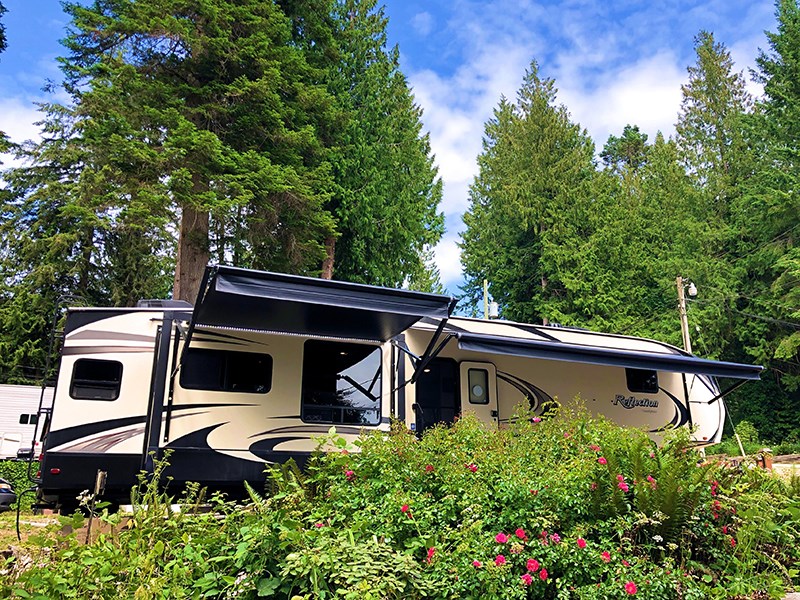With rising house prices, tougher mortgage rules and a lack of rental housing, more people are looking for a cheaper housing alternative, including in Powell River.
One option residents are turning to is RV living. While it is not for everyone, it is a great alternative for some.
Two years ago, our family of four decided to sell our house and temporarily move into a fifth-wheel trailer. This allowed us to pay off debt and look for a more suitable house for our family. Little did we know that as time went on we would come to love the full-time RV lifestyle.
Once our house sold, we began looking at RVs to accommodate our family and started downsizing our possessions. We sold most of our household items and what we could not part with we put in storage.
Having two daughters, we were on the hunt for a unit with a bunkhouse. While the bunkhouse style is growing in popularity, at the time options with this feature were limited, especially those that accommodate full-time living.
After looking at many different units, we purchased a 35-foot fifth-wheel with rear bunks. Never having lived full time in an RV, it was the “perfect unit,” so we thought.
We later learned, as most full-time RV families do, there is always a better unit to fit your needs. Until you spend time living in an RV you do not truly appreciate what you do and do not have.
There were a couple of items that became nuisances as time went on. First was the layout. It was awkward and not homey at all, even though we had imagined it would be cozy and comfortable. Having family and friends over was difficult as there was nowhere for them to sit comfortably; everything seemed crowded.
Cupboards were high up and hard to reach, making a stepladder imperative and taking up more of the limited floor space; the fridge was tiny for a family our size; and the shower was small and short. The biggest issue of all: no laundry. Our perfect trailer in the beginning, while completely livable, turned out not to be the right home.
After watching house prices continue to increase and us falling more in love with the RV lifestyle, we decided not to purchase a house, but instead upgraded our unit to have the comforts of a home. We learned a lot from our first experience and wanted to ensure our next choice was a better fit.
Before purchasing our new RV, we did a lot more research and took a look at what other full-time RV families were living in. One surprising thing we learned was that there are very few manufacturers that will warranty an RV for people who live in it full time. None of the dealers told us this when we purchased our first RV.
We also purchased a lot of extras, like special coatings, that we later learned we did not actually need. These extras can add up to thousands of dollars, so looking into each offering closely to determine its value to the inhabitants before signing anything is important.
RV shopping can be exciting, making it easy to be swept away and make impulsive decisions. Another important thing we learned is to take time, visit the unit multiple times, stand in the shower, reach for things in cupboards, determine where you will store belongings, and imagine having friends over.
Is there room to sit? Does the kitchen have enough room for all the appliances? These all seem like such simple things, but it is easy to overlook them and pay for it later.
One of the biggest benefits of living in an RV is it provides the family with more free time. A thorough cleaning of the inside of the RV takes less than an hour, compared to a house, which can take all day. There is also less maintenance and definitely less yard work than with a traditional house and yard.
Typical maintenance required with an RV includes keeping the roof clean, checking all the seals, washing the outside walls and windows, cleaning the black and grey tanks, disinfecting the water tank, changing water filters, inspecting propane lines, checking batteries, inspecting the underside to ensure there are no holes for rodents to enter, and re-levelling the RV as it settles.
Even with all of these things to think about and look at often, we are still very much richer in time with our family and friends.
Some important details must be considered before living full time in an RV. Long-term RV sites can be hard to come by and most do not allow year-round living.
Before diving in, anyone considering this lifestyle should secure an RV site and “home” insurance. Typical ICBC/private insurance is needed to tow the unit on the road, but this does not cover the unit while it is parked and lived in. Additional insurance is required, just like it is for a regular homeowner or renter. Check with an insurance broker to see what is available.
While many people do not understand our lifestyle and think we are somewhat radical, we would not give it up for anything. RV life has given our family the opportunity to spend more time together, travel and make some amazing memories. It has also taught us that there is more value in time and less in material things.
We have had a storage unit for two years now. I cannot even remember what most of the items inside it are. A fall clean out of the storage unit is due.
This just goes to show, not a lot is needed to make a happy life.
Regan Keil and his family have been living full time in an RV since the fall of 2017. Since that time, the family has purchased four different units, including one for travelling. For more information, follow @fifth_wheelfamily on Instagram.



